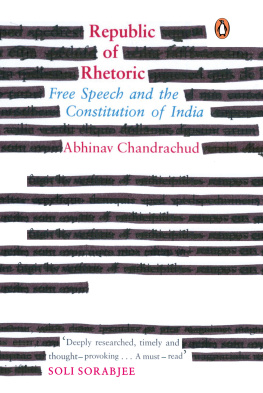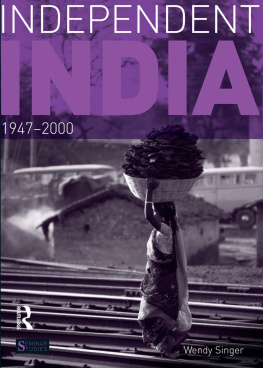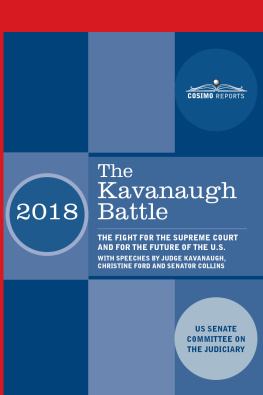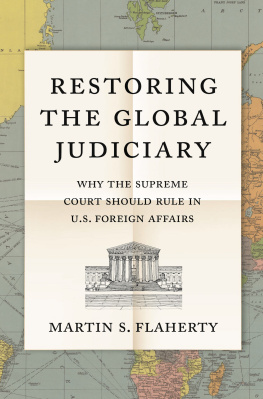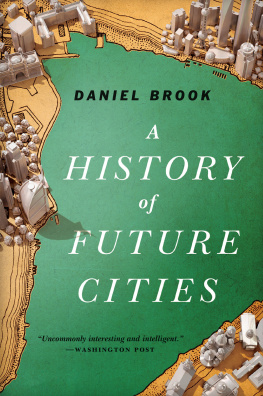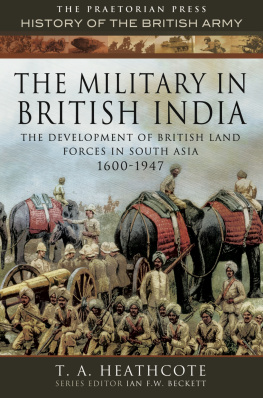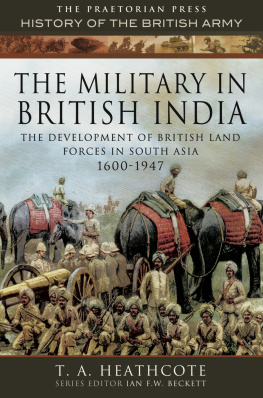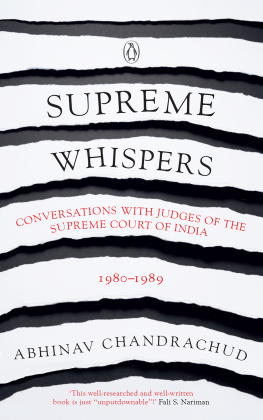An Independent, Colonial Judiciary
An Independent, Colonial Judiciary
A History of the Bombay High Court during the British Raj , 18621947
A BHINAV C HANDRACHUD
Oxford University Press is a department of the University of Oxford.
It furthers the Universitys objective of excellence in research, scholarship,
and education by publishing worldwide. Oxford is a registered trademark of
Oxford University Press in the UK and in certain other countries
Published in India by
Oxford University Press
YMCA Library Building, 1 Jai Singh Road, New Delhi 110 001, India
Oxford University Press 2015
The moral rights of the author have been asserted
First Edition published in 2015
All rights reserved. No part of this publication may be reproduced, stored in
a retrieval system, or transmitted, in any form or by any means, without the
prior permission in writing of Oxford University Press, or as expressly permitted
by law, by licence, or under terms agreed with the appropriate reprographics
rights organization. Enquiries concerning reproduction outside the scope of the
above should be sent to the Rights Department, Oxford University Press, at the
address above
You must not circulate this work in any other form
and you must impose this same condition on any acquirer
ePub ISBN-13: 978-0-19-908948-2
ePub ISBN-10: 0-19-908948-5
Typeset in Minion Pro
by Tranistics Data Technologies, New Delhi 110 019
Printed in India by Rakmo Press, New Delhi 110 020
To the memory of my mother, Aai,
Who taught us to bear
adversity with a smile
CONTENTS
( Plates between pp. xvi and 1 )
TABLES
FIGURES
In Spring 2012, I developed a liking for legal history thanks to a fascinating and refreshingly interesting course I took that quarter: the History of American Law, taught by Professor Lawrence Friedman, a course which was easily one of the best I have ever taken. It was that course which inspired me to delve into the fascinating subject of Indias legal history. I was admitted into the JSD program at Stanford Law School at the end of that quarter, and I thought of two topics which I could potentially write my dissertation on: one, a history of the legal profession of eighteenth-century Bombay, the other, a study of the judges of the Bombay High Court during the British Raj. After consulting faculty and friends, especially my good friend Farhad Dalvi who rightly encouraged me to pursue the subject I found more interesting, I initially decided to write my dissertation on the Mayors Court of eighteenth-century Bombay. Luckily for me, I did not have to abandon my interest in the other topic. First-year JSD students at Stanford Law School were required to take about three courses (one in every quarter) during the year, and the course I was interested in taking in Winter (the Legal History Colloquium under Professors Robert Gordon and Amalia Kessler), had a paper option. By the end of the Winter quarter in 2013, I had written an eighty-page paper on the judges of the Bombay High Court for that course, and I discovered that I was far more passionate about the history of the Bombay High Court than the Mayors Court. I owe a great deal to my good friend, Fernan Restrepo, who advised me over lunch (one of our many memorable lunches at the Arrillaga Family Dining Center) to switch topics for my dissertation, because he thought that my High Court study had more important and interesting conclusions on offer.
My doctoral dissertation at Stanford, and now, this book, could not have been written without the intellectually exhilarating academic environment in the JSD program at Stanford Law Schoola place where we were encouraged to cast off the chains of traditional doctrinal scholarship, to think outside the box and to pursue what we were genuinely passionate about with unhindered intellectual freedom. Not only was I permitted to switch dissertation topics in the middle of my first year in the program, but I was also encouraged to do what I found more interesting. Thank you, Professors Deborah Hensler and Lawrence Friedman, for creating the terrific program that you have at Stanford Law School. The three years that I spent at Stanford were easily among the best of my life. I will dearly miss The Farm, and my regular haunts there: Robert Crown Library, Green Library, the Tressider Memorial Union (with Treehouse, CoHo, Axe and Palm, Jamba Juice, Subway, and Panda Express), Coupa Caf, Ikes Place, the Arrillaga Family Dining Center, the Arrillaga gym, the wrestling room used by the Stanford Ju Jitsu club, the comforting presence of Hoover Tower, the Claw fountain and bookstore, Memorial Church, and of course, my own lovely apartment at Munger where most of this dissertation was written.
I owe an immense debt of gratitude to the faculty who have supervised my dissertation, formally or informally, these past few years. Professor Friedman had warm, wonderfully reassuring words and some very pragmatic advice to offer me each time I walked into his office on the third floor of the Neukom building. Professor Kessler pushed me to do the best work that I was capable of doing, and was always accessible, on Skype when I was overseas, or in person at Stanford. Professor Thomas Blom-Hansen always had time for me despite his busy schedule, and I enjoyed his Indian history insights, especially at our meeting in Mumbai in January 2014. I am especially grateful to Professor Ramachandra Guha, one of Indias finest historians, who kindly agreed to read my dissertation, and from whose comments this book has benefited a great deal. Im grateful to Professor George H. Gadbois Jr for reviewing my dissertation. Im also very grateful to Professor K.L. Daswani: not merely did he help me get access to old books and journals at the Government Law College in Mumbai, but he personally scanned a priceless, old book written by J.D. Inverarity, and sent it to me while I was at Stanford. It is because of such acts of kindness that this book was written. I enjoyed, very much, meeting and speaking with legal historians who have written about the Bombay High Court before me: Professor Mitra Sharafi and Mr Rajan Jayakarmany thanks to them both for their guidance. Many thanks to Binyamin Blum, whose work at Stanford lit the path for my own, and whose advice was very useful. Thanks are also due to Professors Marc Galanter, Robert Gordon, Leandra Zarnow, Aishwary Kumar, and Kate Malleson, and to Dinyar Patel, Rohit De, and Dhvani Mehta. I would especially like to thank Professor Andrew McLaughlin who strongly supported my candidature for the JSD program.
None of this would have been possible without the many libraries I visited, and without the kindness of the many librarians there. Sonia Moss is a priceless asset to the students at Stanford Law School, who went far above and beyond the call of duty in making sure that I got every single book, every microfilm reel, every resource that I ever required. Many thanks to George Wilson and his team at the Robert Crown Library. Thanks also to Lisa Woodcock for her help on the administrative side of things. Im especially grateful to Uma Narayan, the head librarian of the Honble Judges Library at the Bombay High Court, who was enormously kind and helpful. I would also respectfully like to thank the Honble Chief Justice of the Bombay High Court, Chief Justice Mohit Shah, for permitting me to use some photographs from the 1962 commemorative volume of the Bombay High Court in this book. Many thanks to the folks at the National Archives of India (Ms Samyukta and others); the folks at the Nehru Memorial Museum and Library (especially in the manuscripts department); the staff at the British Library; Mrs S. Sahasrabuddhe, Mr Ramdin, and Yasmin Khan at the library of the K.R. Cama Oriental Institute; Stephen Herandien, Lionel Smidt, and Claude Bassuday, archivists at South African College; Tim Converse, and the librarians at the Northern Regional Library Facility; Sherna Doongaji, editor of the magazine of the Government Law College, Mumbai; Benjamin Lee Stone at Stanford for his forensic ability to solve the puzzles I threw at him (for example, what the abbreviations W.M. or A.T. stood for at Oxford); Fiona Colbert at St. Johns College; Cliff Davies, Keeper of the Archives at Wadham College, Oxford; Chelsea Carney, Assistant Archives Trainee, Cambridge University Library; Anna Sander, College Archivist and Curator of Manuscripts, Balliol College, Oxford; John Rawlings, Subject Librarian for Classics, Linguistics, Medieval Studies, Philosophy, and South Asian Studies at Stanford; Amanda Ingram, archivist at Pembroke College; Chris Jeens, Jesus College, Oxford; Georgina Edwards, Archives Assistant, Brasenose College, Oxford; Grant E.L. Buttars, Deputy University Archivist, University of Edinburgh; Andrew Mussell, Archivist at Lincoln College; Sinead Wheeler, Archives Assistant, London School of Economics; Dr John F. Pollard, Fellow Archivist, Trinity Hall, Cambridge; Collin Higgins, St. Catherines College, Cambridge University; Nicholas Rogers, Archivist, Sidney Sussex College, Cambridge; Adam C. Green, Assistant Archivist and Manuscript Cataloguer, Trinity College Library, Cambridge; Penelope Baker, Archivist, Exeter College, Oxford; Erica McDonald, Assistant Librarian, Ward Library, Peterhouse, Cambridge; Dr Patricia McGuire, Archivist, Kings College, Cambridge; Aisling Lockhart, Reading Room Services Executive, Manuscripts & Archives Research Library, Trinity College, Dublin; Sarah Rodriguez, Reading Room Administrator, St. Andrews University; Prof. Geoffrey T. Martin, Hon. Keeper of the Archives, Christs College, Oxford; Michael Riordian, Archivist, St. Johns and the Queens College, Oxford; Judith Curthoys, Archivist, Christ Church, Oxford; Phillipa Grimstone, Sub-librarian, Magdalene College, Cambridge; YiWen Hon, Graduate Library Trainee, St. Johns College, Cambridge; Andrew Mussell, Archivist at Grays Inn; Jo Hutchings, Mrs Frances Bellis, and Guy Holburn at Lincolns Inn; Ursula Mitchel, manager of the Queens University of Belfast Archive; Patrice at the Student Records Office, Queens University of Belfast; Adele, of the Archives and Special Collections, SOAS Library; Peter Mennie at the Highland Council Archives, and the Trustees of the Macleod of Cadboll papers. A special thanks to Sherina Petit for hosting me in London in December 2012.





